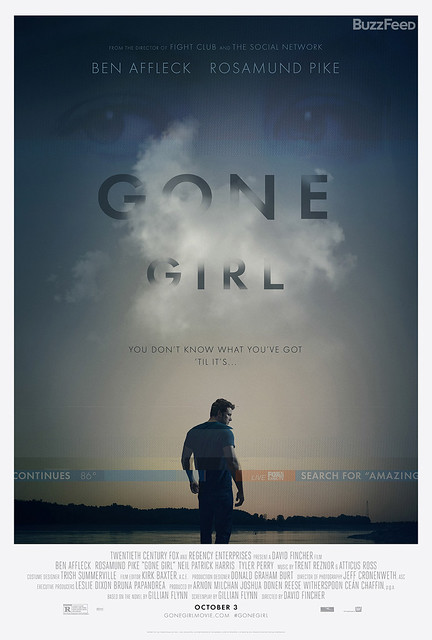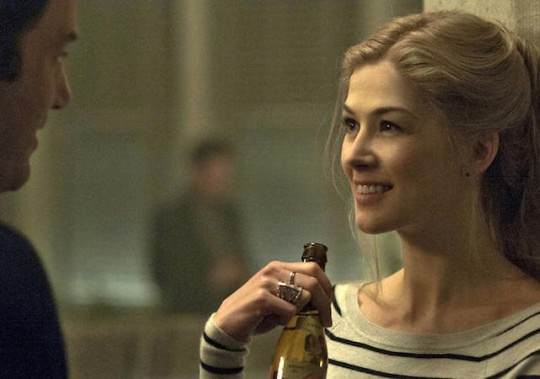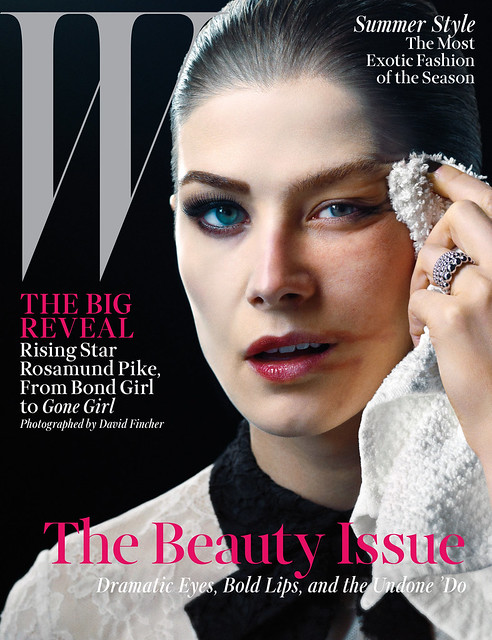Gone Girl (SO MANY SPOILERS. ALL THE SPOILERS. SERIOUSLY, I WILL SPOIL EVERYTHING)
Friday night I went to see Gone Girl. I'm sure most of you have heard about it, since reviews and thought pieces are all over the internet. Do I really even need to talk about something so omnipresent? Probably not, but I have thoughts, and I'd like to share them.
Ok, so like the title said, I'm kind of working on the assumption that you know what happens, so if you don't know and don't want to know, you should probably stop reading now.

I think most people agree that it's a good movie. By pretty much any metric, it is good movie. It's beautifully shot, well acted, and even though I'd read the book and knew all the twists and turns, it still managed to surprise me. It is violent at times, brutally so, but it uses it sparingly to drive home the themes of the movie - namely, the ways in which marriage twists us, and the lengths we will go to to get what we want.
What's really divided most people is the same issue that made the book quite divisive: is there a problem with the way that it portrays women?
I'm feminist as anything, and I actually love the way that it deals with women. Amy Dunne is objectively pretty evil, and you know what? She gets the ending that she wanted. I think it's actually pretty revolutionary that she doesn't get the kind of comeupence that, say, Glenn Close does in Fatal Attraction, or Jennifer Jason Leigh in Single White Female. After all, in the course of the movie she frames a boyfriend for rape, ruining his life. She frames her husband, Nick, for her murder. When she decides she wants her life back, she kills the ex-lover she's been dependent on and frames him for abducting and raping her. She is actually pretty terrifying, the kind of manipulative mastermind that you'd expect to see matching wits with Sherlock Holmes, and she comes out of the whole thing smelling like a rose.

I'm not saying that I like it when terrible people get away with terrible things. I think one of the reasons that people go to movies is because of the rule that bad guys usually get what's coming to them, which is generally not the case in real life. However, Amy Dunne has clearly decided to say fuck it, the rules do not apply to her. When she feels like she has been wronged, she takes cold, calculated, exacting vengeance, setting things up in such a way that the other person knows exactly what happened, and why, but no one else would believe it. Am I a terrible person for rooting for someone like that? (Yes. Yes I am.)
Something else that Amy has that female characters rarely get is agency. When she doesn't like her world, she remakes it in a way that suits her better. Yes, a lot of what she does is a reaction to something that a man does to her, but she is obviously the one deciding what the final outcome will be. She is the prime mover in this movie, and everyone else is just dancing to her tune.
Some of the criticism leveled at the movie is fair. I do think Nick does get set up as the protagonist, sort of by default - yes, he cheats, yes, he lies, yes, he's generally kind of a shitty person, but compared to Amy's malevolence, it would be hard for him not to come out looking like the good guy. Part of that, as others have pointed out, is that in order for the twist to work, we have to get more of the movie from Nick's point of view. Nick has to tell his story to other people, so he has more opportunities to reframe his actions in a positive way. We also get a little less of what's going on in his head, so the misogynistic undertones to things he thinks and says are largely left out. On Amy's side, everything is internal. She's hiding, she's still manipulating the people around her, so she doesn't have the opportunity to comment on what's going on in the same way that Nick does. That's a fairly substantial difference between the book and the movie, which ends up weighting things towards Nick, but I think it's actually balanced out by a very tiny difference - in the book, Nick points out to Amy that she has to live the lie with him. She has to be perfect forever now. In the movie, that line is never said. To circle things back around to my initial point, what's different about this movie is that in the end, Amy gets what she wants.

I really liked something that Gillian Flynn, the author of Gone Girl, said in an interview with The Guardian. "The one thing that frustrates me is the idea that women are innately good." I think she has a really legitimate complaint. There are a million flavors of good girl, but bad women always have to have a backstory that explains why they're bad. They rarely get to just be evil because they're evil (and when they do, a la Disney, the Prince Charming is almost definitely going to skewer her with a sword before marrying the poor, hapless good girl), and they never get to be anti-heroes, spiraling down towards to their own destruction and making it look really cool. There are plenty of scary, truly bad women out there in the real world, and films should reflect that reality.
Has anyone else seen the movie, or read the book? What did you think of it?
Ok, so like the title said, I'm kind of working on the assumption that you know what happens, so if you don't know and don't want to know, you should probably stop reading now.

I think most people agree that it's a good movie. By pretty much any metric, it is good movie. It's beautifully shot, well acted, and even though I'd read the book and knew all the twists and turns, it still managed to surprise me. It is violent at times, brutally so, but it uses it sparingly to drive home the themes of the movie - namely, the ways in which marriage twists us, and the lengths we will go to to get what we want.
What's really divided most people is the same issue that made the book quite divisive: is there a problem with the way that it portrays women?
I'm feminist as anything, and I actually love the way that it deals with women. Amy Dunne is objectively pretty evil, and you know what? She gets the ending that she wanted. I think it's actually pretty revolutionary that she doesn't get the kind of comeupence that, say, Glenn Close does in Fatal Attraction, or Jennifer Jason Leigh in Single White Female. After all, in the course of the movie she frames a boyfriend for rape, ruining his life. She frames her husband, Nick, for her murder. When she decides she wants her life back, she kills the ex-lover she's been dependent on and frames him for abducting and raping her. She is actually pretty terrifying, the kind of manipulative mastermind that you'd expect to see matching wits with Sherlock Holmes, and she comes out of the whole thing smelling like a rose.

I'm not saying that I like it when terrible people get away with terrible things. I think one of the reasons that people go to movies is because of the rule that bad guys usually get what's coming to them, which is generally not the case in real life. However, Amy Dunne has clearly decided to say fuck it, the rules do not apply to her. When she feels like she has been wronged, she takes cold, calculated, exacting vengeance, setting things up in such a way that the other person knows exactly what happened, and why, but no one else would believe it. Am I a terrible person for rooting for someone like that? (Yes. Yes I am.)
Something else that Amy has that female characters rarely get is agency. When she doesn't like her world, she remakes it in a way that suits her better. Yes, a lot of what she does is a reaction to something that a man does to her, but she is obviously the one deciding what the final outcome will be. She is the prime mover in this movie, and everyone else is just dancing to her tune.
Some of the criticism leveled at the movie is fair. I do think Nick does get set up as the protagonist, sort of by default - yes, he cheats, yes, he lies, yes, he's generally kind of a shitty person, but compared to Amy's malevolence, it would be hard for him not to come out looking like the good guy. Part of that, as others have pointed out, is that in order for the twist to work, we have to get more of the movie from Nick's point of view. Nick has to tell his story to other people, so he has more opportunities to reframe his actions in a positive way. We also get a little less of what's going on in his head, so the misogynistic undertones to things he thinks and says are largely left out. On Amy's side, everything is internal. She's hiding, she's still manipulating the people around her, so she doesn't have the opportunity to comment on what's going on in the same way that Nick does. That's a fairly substantial difference between the book and the movie, which ends up weighting things towards Nick, but I think it's actually balanced out by a very tiny difference - in the book, Nick points out to Amy that she has to live the lie with him. She has to be perfect forever now. In the movie, that line is never said. To circle things back around to my initial point, what's different about this movie is that in the end, Amy gets what she wants.

I really liked something that Gillian Flynn, the author of Gone Girl, said in an interview with The Guardian. "The one thing that frustrates me is the idea that women are innately good." I think she has a really legitimate complaint. There are a million flavors of good girl, but bad women always have to have a backstory that explains why they're bad. They rarely get to just be evil because they're evil (and when they do, a la Disney, the Prince Charming is almost definitely going to skewer her with a sword before marrying the poor, hapless good girl), and they never get to be anti-heroes, spiraling down towards to their own destruction and making it look really cool. There are plenty of scary, truly bad women out there in the real world, and films should reflect that reality.
Has anyone else seen the movie, or read the book? What did you think of it?
Jessica
